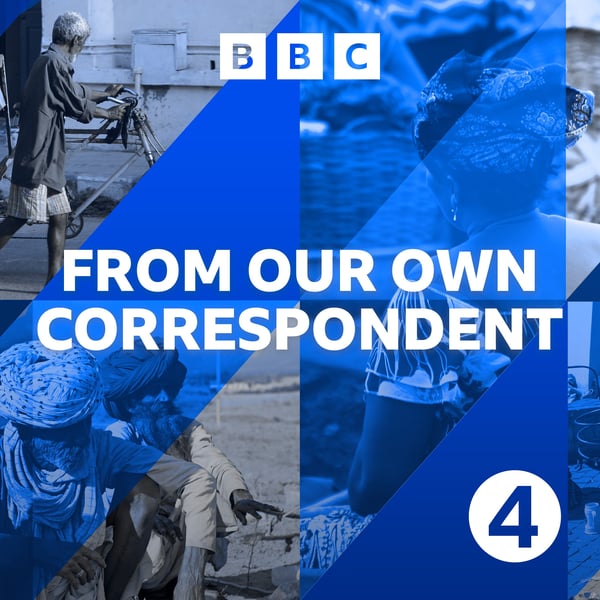Searching for Syria's missing
From Our Own Correspondent
BBC
4.4 • 1.3K Ratings
🗓️ 21 December 2024
⏱️ 29 minutes
🧾️ Download transcript
Summary
Kate Adie introduces stories on Syria, Myanmar, Ivory Coast, the Russian Orthodox church and Tunisia.
The threat of being 'disappeared' was central to Bashar al Assad's system of repression and intimidation. Now he is gone, Syrian families want to know what happened to their loved ones. Yogita Limaye met people who've been searching for relatives for years – and who have discovered likely clues at a hospital morgue.
BBC Eye has been investigating the role of moles in Myanmar's military - soldiers sharing intelligence with pro-democracy groups. These moles have helped the advance of rebel groups and the balance of power is now shifting, with the military now controlling less than a quarter of the country. Rebecca Henschke tells the story of the 'watermelon spies' - military green on the outside, rebel red on the inside.
Chocolate has been one product that has notably suffered from 'shrinkflation' - rising in cost, and shrinking in size. This is in part due to the spiraling cost of cocoa - but not everyone involved in its cultivation is getting rich, as John Murphy discovered when he met farmers in Ivory Coast.
The war in Ukraine has been sanctified by Patriarch Kirill of Moscow - head of the Russian Orthodox Church. He's even said Russian soldiers who die on the battlefield will be washed of their sins - but not everyone in the church agrees with this stance. Lucy Ash catches up with one priest risking punishment for speaking out.
Tunisia recently hosted the World Morse Code championship – a fiendishly competitive tournament, in which participants are challenged to accurately receive, copy and send coded transmissions as fast as possible. Monica Whitlock went to watch the competitors in action.
Series Producer: Serena Tarling Production coordinator: Katie Morrison and Sophie Hill Editor: Richard Fenton-Smith
Transcript
Click on a timestamp to play from that location
| 0:00.0 | Hello, today we're in Myanmar, where we hear from the so-called watermelon spies, soldiers turned informants for the rebels. |
| 0:14.7 | The cost of a chocolate advent calendar may have been rather higher this year, thanks to soaring cocoa prices, but are growers |
| 0:22.8 | seeing any benefit in Ivory Coast? We meet a Russian priest in exile in Germany who's found a new |
| 0:29.3 | faith community after being ostracized by the Moscow Patriarch. And finally, forget end-to-end |
| 0:36.3 | encryption. We listen in on the Morse Code World Championship in Tunisia. |
| 0:42.0 | But first, to Syria. While Basha al-Assad may have fled to Moscow, many of the former president's |
| 0:48.7 | web of security officials, police and informants remain in the country. The challenge ahead of uniting the country |
| 0:56.0 | while trying to temper those seeking retribution is a thorny one. This week, videos have been posted |
| 1:02.3 | online about mass graves, where Assad's regime buried those tortured to death in Syria's notorious |
| 1:09.1 | prisons. The threat of being arrested and never heard from again was a central part of the regime's |
| 1:15.3 | system of repression and intimidation. |
| 1:18.7 | Yoghita Le Maia met Syrians who've been searching for their family members for years |
| 1:23.5 | and who have now discovered likely clues at a hospital morgue. |
| 1:28.7 | When we entered the Damascus Hospital, within minutes we were surrounded by people holding up their phones, |
| 1:35.3 | eager to show us photos of their missing loved ones. People shouted out names. Four brothers |
| 1:41.2 | screamed one man. Another one held up two fingers, one for each of his missing brothers. |
| 1:47.8 | Muyasar Talib, who's in her 30s, was looking for her husband, Muhammad Ali Bakr. |
| 1:53.8 | She says he was taken by Bashar al-Assad's intelligence officers while he was driving his taxi 10 years ago, |
| 2:00.0 | and she's had no information about him since, |
| 2:03.3 | having to raise their two children on her own. We visited so many police stations in prisons. They told |
| 2:09.7 | us they don't have his name, Muayasar said. She doesn't know why Muhammad was taken, but now, |
| 2:16.1 | with Assad and his regime gone, she's hoping to find |
... |
Please login to see the full transcript.
Disclaimer: The podcast and artwork embedded on this page are from BBC, and are the property of its owner and not affiliated with or endorsed by Tapesearch.
Generated transcripts are the property of BBC and are distributed freely under the Fair Use doctrine. Transcripts generated by Tapesearch are not guaranteed to be accurate.
Copyright © Tapesearch 2025.

